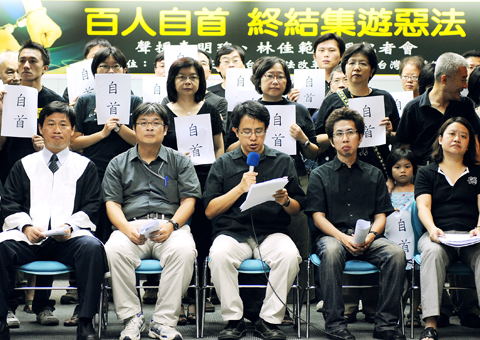Activists, academics ‘surrender’ to protest law
By Loa Iok-sin
STAFF REPORTER
Tuesday, Jul 14, 2009, Taipei Times, Page 1

Members of Academia Sinica, professors and social activists attend a press conference in Taipei yesterday to protest against the Assembly and Parade Act and show their support for Lee Ming-tsung and Lin Chia-fan, who face charges under the act.
PHOTO: LO PEI-DER, TAIPEI TIMES
More than 120 academics and human rights activists said yesterday they would turn themselves in to prosecutors for breaking the Assembly and Parade Act (集會遊行法) in a protest against the legislation.
One after another, more than 30 people gave their name and occupation at a press conference in Taipei, telling prosecutors that they had violated the Act and would like to turn themselves in.
They did so in a show of support for National Taiwan University (NTU) sociology professor Lee Ming-tsung (李明璁) and Taiwan Association for Human Rights chairman Lin Chia-fan (林佳範), who have been indicted for contravening the Act in May and last month respectively.

Lee was indicted for taking a leading role in a student demonstration outside the Executive Yuan last November that demanded a revision of the Act, while Lin was indicted for organizing a separate demonstration outside the legislature.
“We believe that the right to assemble and parade are fundamental rights protected by the Constitution and that peaceful assembly is not an illegal act,” said NTU law professor Yen Chueh-an (顏厥安), whose name topped the “surrender list.”
“We have all taken to the streets without government permission. Therefore, if Lee and Lin are guilty, we’re equally guilty,” he said.
National Tsinghua University sociology professor Lii Ding-tzann said he would also turn himself in, even though he didn’t think he had done anything illegal.
“I want to do so because the Assembly and Parade Act is unconstitutional and I want to debate it with a judge and a prosecutor in court,” he said.
He also accused the judiciary of becoming a tool of the executive branch by “threatening people not to speak out and prosecuting people who do.”
More than 50 lawyers joined the campaign by volunteering to provide legal assistance to those on the list.
Meanwhile, the activists and academics also called on the Cabinet and the Chinese Nationalist Party (KMT) to reconsider their version of an amendment to the Act.
Although the Cabinet-proposed revision removes the requirement for organizers to apply for permission before holding a rally, organizers must obtain authorization from the owner of the venue beforehand.
“Since most demonstrations are held in public places, organizers would have to get authorization from the government,” said Liu Ching-yi (劉靜怡), a professor at NTU’s Graduate Institute of National Development.
“So how is that different from applying for a permit?” Liu said.
Liu said she also did not agree with the amendment granting police the power to maintain order and disband demonstrations.
“It makes police both player and referee,” she said.
This story has been viewed 348 times.


